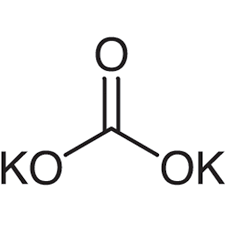HI! I’M ELEMENT AI.
Potassium Carbonate

Product Description
Potassium carbonate, also known as potash or pearl ash, is a versatile chemical compound with numerous industrial, commercial, and household applications.
Product:
Potassium Carbonate
CAS:
584-08-7
Synonym:
Carbonic acid, potassium salt; Carbonate of potash; Dipotassium carbonate
Structure:

Typical Characteristics
Appearance
White powder
Density
2.29 g/cm3
Melting point
891 °C
Molecular Weight
138.21
Odor
Odorless
Purity
≥99%
Uses, Applications & Markets
Key applications
get a quote
We Offer Potassium Carbonate
in various grades
A few of the grades available are listed below:



Potassium Carbonate used in many
industry applications
Potassium carbonate, also known as potash or pearl ash, is a versatile chemical compound with numerous industrial, commercial, and household applications. Here are some of its uses:
- Soap and Glass Production: Potassium carbonate is a key ingredient in the manufacture of soap and glass. In soap making, it is used as a softening agent to enhance the cleaning properties of soap. In glass production, it is added to the raw materials to lower the melting point and improve the clarity and durability of glass.
- pH Adjustment: Potassium carbonate is commonly used as a pH regulator or buffering agent in various industrial processes, such as in the production of fertilizers, pharmaceuticals, and food additives. It helps maintain the desired pH level in chemical reactions and formulations, ensuring optimal conditions for process efficiency and product quality.
- Food and Beverage Industry: Potassium carbonate is approved as a food additive (E501) by regulatory agencies and is used in the food and beverage industry for various purposes. It may be employed as a leavening agent in baking to improve the texture and rise of baked goods. Additionally, it is used as a pH regulator, acidity regulator, and stabilizer in certain food and beverage products.
- Electroplating: Potassium carbonate is utilized in electroplating baths as an electrolyte or buffering agent to facilitate the deposition of metal coatings onto substrates. It helps maintain the pH of the plating solution and provides conductivity for the electroplating process. Potassium carbonate is commonly used in the electroplating of metals such as gold, silver, and copper.
- Chemical Manufacturing: Potassium carbonate serves as a precursor or intermediate in the synthesis of various potassium compounds and specialty chemicals. It is used in the production of potassium bicarbonate, potassium hydroxide, potassium permanganate, and potassium silicates, among other chemicals. These compounds find applications in agriculture, pharmaceuticals, textiles, and other industries.
- Photography: Potassium carbonate is used in certain photographic processes, particularly in the development of black and white films and prints. It is employed as an alkaline accelerator or activator in the development solutions to enhance the speed and contrast of photographic images. Potassium carbonate helps facilitate the chemical reactions involved in the development process.
- Flue Gas Desulfurization: Potassium carbonate can be used in flue gas desulfurization (FGD) systems to remove sulfur dioxide (SO2) from industrial exhaust gases. It reacts with SO2 to form potassium sulfite or potassium sulfate, which can be easily separated from the gas stream. Potassium carbonate-based FGD processes are employed in power plants, refineries, and industrial boilers.
- Medicinal Applications: Potassium carbonate has historical and traditional uses in medicinal preparations, although its use has declined with the availability of safer alternatives. It was once used as an antacid to relieve symptoms of acid indigestion and heartburn. However, due to its potential side effects and interactions, it is no longer commonly used for this purpose.
- Fire Extinguishing: Potassium carbonate is sometimes used in certain types of fire extinguishers, particularly those designed for Class K fires involving cooking oils and fats. It reacts with the fatty acids in the burning oil or fat to form potassium soaps, which help smother the fire and prevent reignition. Potassium carbonate-based extinguishing agents are effective for suppressing kitchen fires.
- Textile Industry: Potassium carbonate is used in textile processing for applications such as dyeing and printing. It may be employed as a neutralizing agent or pH regulator to adjust the acidity or alkalinity of dye baths and textile finishing solutions. Potassium carbonate helps ensure proper dye uptake, color development, and washfastness in textile dyeing processes.